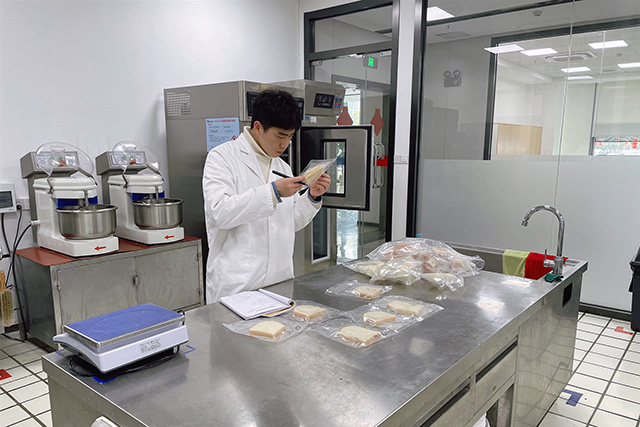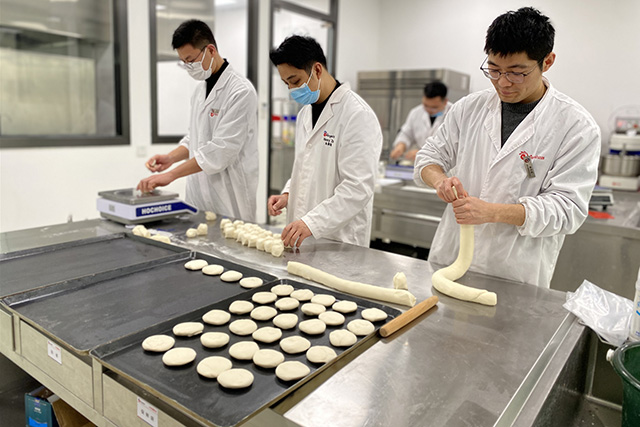-
Home > News & Events > News > Company
Preservatives are added in food processing to prevent food spoilage. Chemical preservatives such as calcium propionate and sodium dehydroacetate are the most common in baked foods. With the upgrading and innovation of the health industry and the enhancement of consumer health awareness, the natural freshness of ingredients and the transparent and concise "cleaning labels" of food formulas are becoming increasingly mainstream, and consumers are more inclined to biological preservatives. That's why the R&D personnel at Angel Baking and Food Innovation Technical Center have been busy preparing for the upcoming two biologic preservatives.
Putting flour, yeast, and bio-preservatives into the mixer, Yan Ziyun, Assistant Engineer of Angel Baking and Food Innovation Technical Center, starts stirring with the start button. Application testing of bread preservatives is currently underway. "Next, it will be shaped, proofing, baked, sliced and packaged, under observation and recording," said Yan.

Yan Ziyun Observing and Recording
"Compared to chemical preservatives, biologic preservatives are more natural and healthy, safer, and more in line with the current trend." Zhang Xijun, Director of the New Food Ingredients Research Institute at Angel Baking and Food Innovation Technical Center, introduced that Angel bio-preservative are fermented by edible bacterial strains, which can inhibit the growth and reproduction of fungi, thereby extending the shelf life of food.
Bio-preservatives keep food fresh longer. The shelf life of sweet bread is generally 3-5 days, and it can reach 21 days after using bio-preservatives.
Yan introduces that sliced and packaged bread should be placed in a constant temperature and humidity box to simulate the summer environment for observation. "We maintain a temperature of 36 ℃ and humidity of 85% inside the box, observe and record the shelf life and mold growth of the bread, and then proceed with relevant testing."
Last June, Angel's Good Partner XianBao bio-preservative was recognized as soon as it came into the market, which mainly solved the preservation problem of fermented flour products such as steamed buns and Mantou. "The two bio-preservatives currently under development will solve the preservation problem of bread and wet noodles," added Yan.

R&D personnel at Angel Baking and Food Innovation Technical Center Busy with Testing
The two bio-preservatives were developed in October last year and have now undergone over 60 application experiments. "The product is about to enter the pilot stage, and the formula has basically been finalized. Currently, the main focus is on shelf life verification and formula optimization. We must launch it before the beginning of summer this year to meet the needs of customers in hot weather." Zhang Xijun said.
"We hope to reduce production costs through continuous technological innovation, so that more food production enterprises can use safer preservatives," said Zhang Xijun with high expectations.
"In the new year, Angel will continue to increase its technological innovation efforts, continuously deepening its cultivation in areas such as strain breeding, research and development of new food ingredients, and innovation in application technology scenarios." Zhang Yan, Assistant General Manager of Angel Yeast and Dean of the Research Institute, introduced that in 2024, Angel will implement over 40 major R&D projects and develop over 200 new products.







